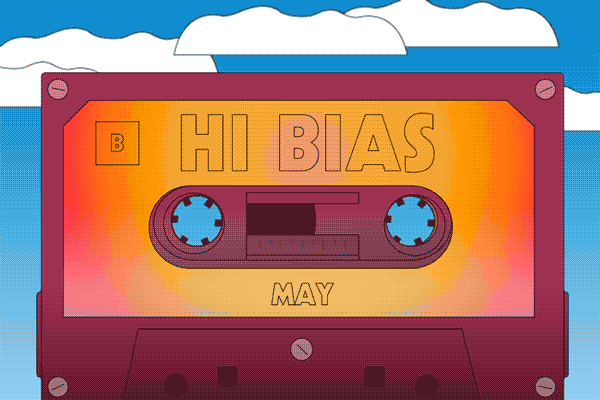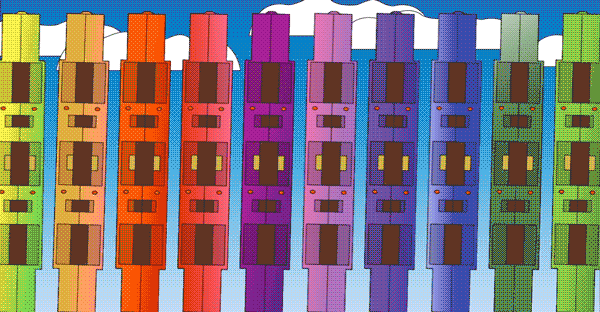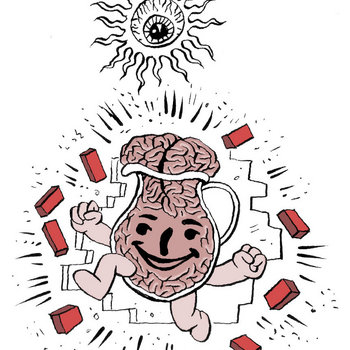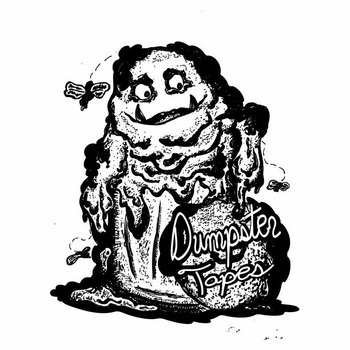

Welcome to Hi Bias, a monthly column highlighting recent cassette releases on Bandcamp, and exploring the ideas behind them with the artists who made them. Rather than making sweeping generalizations about the “cassette comeback,” we prefer here simply to cover releases that may escape others’ radar due to their limited, cassette-focused availability.
AJA
AJA [Opal Tapes]


On her self-titled debut tape under the moniker AJA, U.K.-based musician Aja Ireland twists together exploding beats, grinding textures, and harrowing vocalizations. Her tense mix exudes authority—she always seems in control of her sprouting sounds—yet her music also feels open and unrestrained. “I enjoy being precise and finding a balance between a raw noise edge, but with sound separation, spatial awareness and mixing,” she explains. “All the music was put together just purely from emotions and gut instinct… I just let the music write itself, with me being a vessel through which it could be heard.”
There’s a psychic workout to be had in immersing yourself in the hammering “Tuck It, Tape It” or the exploding “Charge,” both of which benefit from unpredictable rhythms. “There are always beats within beats to be found, and I’m interested in pulling those out,” Ireland says. “You can also do this with silence as well, which is interesting!” But beyond their visceral impact, are there literal meanings behind AJA’s pulse-quickening tracks? “There are, but they are quite intense and personal,” she admits. “So I will just say that they are around themes of sexuality, mental health, addiction, gender, and many other things I can’t put into words. I do hope for people to be able to have their own personal experience when listening,” she continues. “Whatever emotion it evokes is down to the individual’s own path, and I like to think it’s quite open for different people to feel and connect in different ways.”
The potential connection in AJA is enhanced by Ireland’s vocals, which sear paths through the tracks despite being mostly abstract and non-verbal. “I am inspired by Pre and AIDS Wolf kind of vocals, which are a combination of screaming and kind of gibbering high-pitched noises,” she explains. “I don’t sing lyrics, rather I just let whatever comes out in the moment to be free, so it’s kind of like channeling something.”
AIDS Wolf, the now-defunct no wave-leaning Canadian band, were a crucial discovery for Ireland. “They were my first insight into noise and experimental music and I absolutely fell in love,” she recalls. Growing up in Kettering, about 80 miles north of London, she was exposed to Faust and The Damned by her family, creating what she characterizes as a “punk ethic I’ve had build in me since I was a toddler.”
Punk certainly rings sonically through the physically-affecting music on AJA, and it’s also informed her DIY approach. She builds her music with field recordings and software plug-ins, and also runs sound art workshops in her current hometown of Nottingham, covering everything from gig booking and promotion to costume and visuals to “how to overcome challenges of self-doubt.” Her sessions often include a guided meditation as well as a lesson in how to make field recordings.
“These workshops are really important to me because not only am I building my own sample library up, but it also allows me to give something back and share what I’ve learnt to other people,” Ireland says. “It also allows me to connect with other like-minded people in a more intimate way, and I hope that the open conversations I try to facilitate can help build people’s confidence and make them feel like they have a supported community around them.”

Sunwatchers
Basement Apes [self-released]



Cassette

Every Sunwatchers release sounds raucous, but Basement Apes is especially rough and tumble. That makes sense given that this is a disparately-sourced collection of live and practice-space material, but the band has done well to pick the most burning cuts from what must be a pretty large archive. It also helps that there are prime guests all over Basement Apes, including David First rifling off heated harmonica on “The Works,” Heather McIntosh sanding cello strings during the cycling “The Scaled Birch,” and David Watson kneading his bagpipes on the immersive noise jam “The City Gates.” Basement Apes recalls the glory days of ‘90s DIY cassettes, when bands would dip into stuff that might seem improper for official releases but was still worth hearing.
Howard Stelzer
The Crossing: Official Motion Picture Soundtrack [Flag Day]



Cassette

As he explains in his notes to The Crossing, Howard Stelzer is fascinated by the American Southwest. He hasn’t actually been there much—he’s a lifelong East Coaster—but he does a great job of musically recreating the vast expanses and sandy colors of that region, which is the setting for the Joe Taylor-helmed Western that Stelzer was tasked with soundtracking. The director requested a theme based on a few bars of Brahms, so Stelzer had friend and collaborator Jeff Barsky (of Insect Factory) play that tune on guitar, then reshaped it with the help of tape decks and field recordings. The result is desolate, windy music that’s moving, offering enough layers—especially in its chilly guitar echoes—to tell a deep story without pictures.
Wet Piss
Wet Piss [Dumpster Tapes]



Cassette

Chicago quartet Wet Piss feel like a punk band. Their sound is fast and loud, and the vocals of frontdude Magik Ian (of Maximum Pelt) are nervously urgent, in places sounding like Jello Biafra doused in kerosene. But they’re really more like a psych band in disguise, unafraid to follow instrumental tangent and unfurl guitar solos. Still, everything on Wet Piss maintains a basic grounded-ness—due in large part to the concrete-solid rhythms of drummer Karissa Talanian (of Lil Tits and many other projects) and bassist Dillon Kelley—that makes all six tracks sound far from indulgent. Come for the heartbeat-quickening energy, stay for the journeys into the stratosphere.
Manas
Live At [Nullzone]


Tashi Dorji’s guitar playing is so fertile it has spawned two powerful duos, one with Tyler Damon on drums, and the other, Manas, featuring drummer Thom Nguyen. It’s pointless to compare the two (especially since Damon himself played on one Manas record), as both outfits generate lots of different sounds, from dense, obliterating improv to sparse, careful sculpture. All of that is on display on Live At. Through two side-long, 14 minute tracks, Dorji and Nguyen shape sonic energy like landscapers carving animal topiaries out of bushy trees. Except these musical animals keep morphing, shifting through ideas and moods so energetically it feels like the air around them is reforming by the second.







